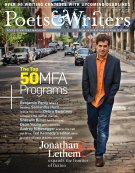She Writes, a Web site established for women writers, has joined the ranks of literary social-networking utilities. Launched in June by author Kamy Wicoff, in collaboration with Deborah Siegel, She Writes aims to provide a place "where women writers working in every genre, in every part of the world, and of all ages and backgrounds, can come together in a space of mutual support." At the time of this writing, nearly four thousand women writers—from poets to novelists to biographers—have joined the community. Well-known members include poet and critic Alicia Suskin Ostriker, novelist Kate Christensen, and fiction writer and essayist Francine Prose.
She Writes provides social-networking tools for writers as well as offering a range of practical information through member blogs, forums, and Webinars.
While social-networking giants Facebook and Twitter allow writers to promote books and events, and other literary sites such as Goodreads and LibraryThing offer authors further opportunities to connect with readers, She Writes provides social-networking tools for writers as well as offering a range of practical information through member blogs, forums, and Webinars. But, perhaps most important, She Writes distinguishes itself by hosting discussions about some of the most pressing issues facing women writers today.
She Writes is deeply rooted in the concept of social networking. In fact, it's an offshoot of a series of salons for women writers first established in London in 2003 by Wicoff and the late biographer Diane Middlebrook, who together wanted to facilitate "an intergenerational discussion ranging from the practical to the theoretical but sharply focused on the business and craft of writing," as Wicoff puts it, "an exchange both supportive and provocative—food for the soul."
Both Wicoff and Middlebrook eventually returned to the United States, but the London salon continued for several years under the direction of editor Sarah Greenberg and author Lisa Appignanesi. Middlebrook then went on to form another branch in San Francisco with Marilyn Yalom, who has written numerous books and articles on literature and women's history, while Wicoff started a third outpost in New York City with memoirist Nancy K. Miller, who teaches comparative literature at Columbia University. Over the past five years, the New York City salon has hosted over twenty gatherings, and has included distinguished women writers such as Vivian Gornick, Erica Jong, and Katha Pollitt.
Siegel recalls attending one of the New York City salons earlier this year, at which Elaine Showalter discussed the negative review the New York Times Book Review had given her latest book A Jury of Her Peers: American Women Writers From Anne Bradstreet to Annie Proulx (Knopf, 2009). Showalter was "passionate," says Siegel, "about the resistance she felt within the established literary community to the first comprehensive history of American women writers." The women writers in attendance then began discussing the larger issue of what is deemed acceptable in the realm of women's literature.
It's precisely this kind of conversation that Wicoff and Siegel now foster on She Writes. Topics of discussion have included the role of feminist bloggers; writing and technology; and issues facing writers addressing lesbian, gay, bisexual, and transgender themes. Along with providing information about practical matters that pertain to publishing, She Writes, like Facebook, allows users to post profiles, add events, "friend" other writers, and contribute to ongoing conversations by joining groups structured around topics such as Historical Fiction, Virtual Critique, Marketing and Promotion, and Across/Beyond/Defying Genre. Users may also join groups designated by geographical areas, through which the founders hope additional branches of the flesh-and-blood salon that started it all will be established.
"She Writes was founded on the psychology of abundance, the belief that more is more," Wicoff says. "How much time each of us could save, how much more effective each of us could be, if we all told one another what we've learned."
Elrena Evans is coeditor of Mama, PhD: Women Write About Motherhood and Academic Life (Rutgers University Press, 2008).








